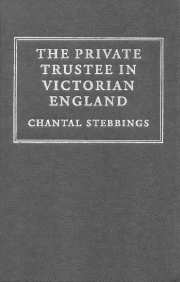Book contents
- Frontmatter
- CONTENTS
- Foreword by Lord Templeman
- Table of statutes
- Table of cases
- List of abbreviations
- The Trustee
- 1 Challenges to trusteeship
- 2 The relationship with the settlor
- 3 The relationship with the beneficiaries
- 4 The relationship with co-trustees and agents
- 5 Trustees in the commercial context
- 6 Transgressions by trustees
- Index
6 - Transgressions by trustees
Published online by Cambridge University Press: 05 July 2009
- Frontmatter
- CONTENTS
- Foreword by Lord Templeman
- Table of statutes
- Table of cases
- List of abbreviations
- The Trustee
- 1 Challenges to trusteeship
- 2 The relationship with the settlor
- 3 The relationship with the beneficiaries
- 4 The relationship with co-trustees and agents
- 5 Trustees in the commercial context
- 6 Transgressions by trustees
- Index
Summary
The breadth of the trustees' powers in the administration of their trust, and the duties imposed on them, were such that transgressions were almost impossible to avoid. Anything that a trustee did which was not in accord with the provisions of his trust instrument or the rules of Equity constituted a breach of trust, as did any omission to do what he was meant to do. That some trustees in the nineteenth century were corrupt and defrauded their beneficiaries was undeniable. The number of deliberate and fraudulent transgressions by trustees was not known, though it was generally agreed that they were relatively few in the context of all breaches of trust. The nature of the original relationship between the trustees and the beneficiaries within each individual trust to some extent determined the likelihood of fraud. Whether the beneficiaries were educated, wealthy, ignorant or poor, and whether the trustees were numerous, responsible, able, lay or professional were factors which determined the predisposition of a trust fund to be undermined by fraud. Educated and wealthy beneficiaries were not in practice the principal victims of fraud or indeed of incompetence. Not only were they more likely to have able and responsible trustees who knew their duty and performed it conscientiously, they also had the knowledge and education to ask questions of their trustees. If in doubt they had the social and family connections to seek informed advice, and the means to acquire expert legal advice if necessary.
- Type
- Chapter
- Information
- The Private Trustee in Victorian England , pp. 163 - 197Publisher: Cambridge University PressPrint publication year: 2001

